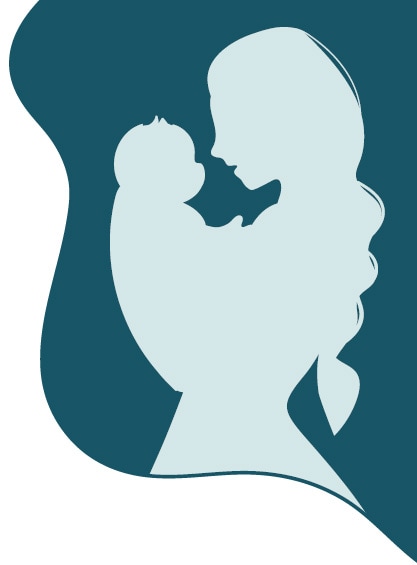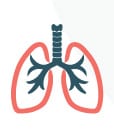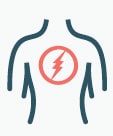Women with Sickle Cell Disease and Postpartum Care
What to Know After Delivering Your Baby

Postpartum care is health care you get after you deliver. There are a lot of things to consider as you take care of your newborn, but don’t forget to take care of yourself, too. Postpartum care is important to help you stay healthy physically, emotionally, and mentally as you recover and bond with your baby. Learn what steps you can take to have a healthy recovery.
- Visit your obstetrician/gynecologist or other reproductive healthcare provider and your sickle cell disease (SCD) provider within 3 to 4 weeks after delivery or sooner if your care providers think it is appropriate. Discuss with your SCD provider if any changes need to be made to your treatment plan. Some medicines are not recommended for use while breastfeeding.
- Get as much rest as possible. Newborns can wake every 2 to 3 hours for a feeding, making it hard to get long stretches of uninterrupted sleep. Ask for support from your partner, family, and friends so you can rest to stay healthy.
Know that your body will experience physical changes as it recovers.
- If you had a vaginal birth, talk with your care provider on ways to manage your pain as you heal.
- If you had a cesarean delivery, it will take time for the wound to heal. Follow your provider’s advice regarding care of the wound.
- Postpartum bleeding can last up to 6 weeks, with bleeding often being the heaviest the first few days.
- You may feel contraction-like pain during the first few days after delivery.
- Some babies born to women with SCD are born prematurely and may require care in the neonatal intensive care unit (NICU).
- If you required significant doses of opioids for pain management during your pregnancy, your newborn could possibly experience opioid withdrawal, a condition known as neonatal abstinence syndrome, and it may be one reason your baby may need care in the NICU.
- All babies have a newborn screening blood test before leaving the hospital. This blood test looks for a number of conditions. The test will identify if your baby has a type of SCD or is a carrier for an abnormal hemoglobin gene (such as hemoglobin S or hemoglobin C). Babies born to mothers with SCD will have at least one abnormal hemoglobin gene.
Learn the signs and symptoms of blood clots and know when to see a provider. All women are at an increased risk for a blood clot after delivery and up to 3 months afterward, but women with SCD are at an even higher risk. The risk is highest in the first 6 weeks after delivery, especially if you had a cesarean delivery. Many women with SCD will be prescribed anticoagulants (blood thinners) to help prevent blood clots. Talk with your provider to learn if you need to take them.
- Swelling
- Pain or tenderness not caused by injury
- Skin that is warm to the touch
- Redness or discoloration of the skin
Call your provider as soon as possible if you experience any of these symptoms.
- Difficulty breathing
- Chest pain that often worsens with a deep breath or cough
- Coughing up blood
- Faster than normal or irregular heartbeat
Get medical attention immediately if you experience any of these symptoms.
Get medical care immediately if you experience any urgent maternal warning signs, such as

Headache that won’t go away or gets worse over time

Dizziness or fainting

Changes in your vision

Fever of 100.4˚F higher

Overwhelming tiredness

Extreme swelling of your hands or face

Thoughts of harming yourself or your baby

Trouble breathing

Chest pain or fast beating heart

Heavy vaginal bleeding or discharge after pregnancy

Severe nausea and throwing up

Severe belly pain that doesn’t go away

Baby’s movement stopping or slowing during pregnancy

Severe swelling, redness or pain of your leg or arm

Vaginal bleeding or fluid leaking during pregnancy
These could be signs of very serious complications. If you can’t reach a healthcare provider, go to the emergency room. Make sure the provider knows you delivered a baby within the last year and that you have SCD.
Talk with your provider if you or your family or friends think you are experiencing the signs and symptoms of postpartum depression. Your provider can share treatment options, such as medicine and counseling, to help you feel better. The signs and symptoms of postpartum depression include the following:
- Crying more often than usual
- Feelings of anger
- Feeling distant from your baby
- Worrying or feeling overly anxious
- Any thoughts of harming yourself or your baby
New mothers can experience “baby blues,” a term used to describe negative feelings, sadness, and mood changes after giving birth. It usually gets better without any treatment within 2 weeks after delivery.
Postpartum depression is more intense and requires treatment. Talk with your provider if you experience any of these symptoms.
Consider your plans for contraception (birth control) after having the baby. Birth control can sometimes be started immediately after delivery and not just at a later visit. If interested in birth control, talk with your care team to learn about all the options for birth control that are safe for women with SCD.
- https://www.cdc.gov/pregnancy/after.html
- https://www.marchofdimes.org/find-support/topics/neonatal-intensive-care-unit-nicu/coping-stress-nicu
- https://www.cdc.gov/pregnancy/opioids/basics.html
- https://www.cdc.gov/newbornscreening/index.html
- https://www.cdc.gov/ncbddd/sicklecell/facts.htm
- https://www.cdc.gov/ncbddd/dvt/pregnancy.html
- https://www.cdc.gov/hearher/maternal-warning-signs/index.html
- https://www.acog.org/womens-health/faqs/postpartum-depression
- https://www.cdc.gov/reproductivehealth/contraception/index.htm
Baby’s First Test: Sickle Cell Anemia:
https://www.babysfirsttest.org/newborn-screening/conditions/sickle-cell-anemia
U.S. Department of Health & Human Services—Office on Women’s Health: Recovering from Birth:
https://www.womenshealth.gov/pregnancy/childbirth-and-beyond/recovering-birth
March of Dimes: Sickle Cell Disease and Your Baby:
https://www.marchofdimes.org/find-support/topics/planning-baby/sickle-cell-disease-and-your-baby
Postpartum Support International:
https://www.postpartum.net/
Health Resources and Services Administration Maternal & Child Health: National Maternal Mental Health Hotline:
https://mchb.hrsa.gov/national-maternal-mental-healthhotline
Women with Sickle Cell Disease and Preconception Care: What to Know Before Getting Pregnant:
https://www.cdc.gov/ncbddd/sicklecell/materials/women-with-scd-preconception-care.html
Women with Sickle Cell Disease and Prenatal Care: What to Know During Pregnancy:
https://www.cdc.gov/ncbddd/sicklecell/materials/women-with-scd-prenatal-care.html
